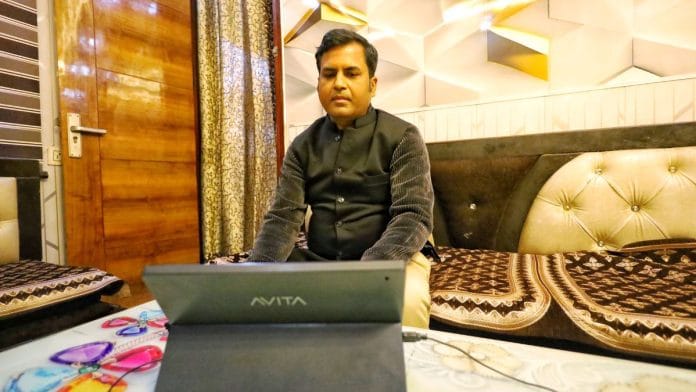New Delhi: “Congratulations, Papa.” For a 100 per cent visually impaired candidate who cleared UPSC way back in 2008 but never entered the service, his daughter’s words were a reminder that his 15-year-long legal battle with the system had been worth it. Now, at age of 46, he is finally set to join the Indian Information Service.
“Most candidates’ battles end with the UPSC results. But for me, it was different. After the final result, another battle began in the courts for my recommendation. And it wasn’t a straightforward fight,” said Kumar, sitting in his sofa at his three-BHK house in Delhi’s Rohini West area.
Shiwam Kumar is among several visually impaired candidates in India who despite clearing the Civil Services Examination never see the appointment because disability reservation provisions aren’t implemented effectively. His case went through the Central Administrative Tribunal, the Delhi High Court, and finally, the Supreme Court.
On 8 July 2024, the top court invoked Article 142 to direct the Union government to appoint candidates such as Shiwam Kumar and Pankaj Shirvastava to the IRS or another service against reserved vacancy backlogs. The court also criticised the Centre for failing to implement disability reservation laws and making qualified candidates struggle needlessly.
I was 30 years old when I took the exam, and now I am 46. I couldn’t plan much (in life) during this period because of the case, and I spent lakhs of rupees on it. Although many lawyers helped me out of sympathy, this victory didn’t come easy
Shiwam Kumar
Kumar’s case remained with the CAT between 2009 and 2013, entered the High Court only 2013, and was heard in the Supreme Court for 10 years—between 2014 and 2024.
“I was 30 years old when I took the exam, and now I am 46. I couldn’t plan much (in life) during this period because of the case, and I spent lakhs of rupees on it. Although many lawyers helped me out of sympathy, this victory didn’t come easy,” said Kumar, dressed in a black sweater and beige pants, holding his two-year-old daughter.
Shiwam Kumar’s 15-year legal battle highlights the systemic challenges faced by candidates with visual disabilities trying to enter India’s steel frame. While legal provisions reserve 1 per cent of seats for the visually impaired, the selection culture is embedded in following a hierarchy for disabilities—Locomotor disabilities often receive more recommendations to join the service than visual impairments. And when the system encounters misuse of reservation provisions such as in the case of former trainee IAS Pooja Khedar, a heightened scrutiny only makes the case of the visually impaired extremely difficult. The Persons with Disabilities (PwD) Act, 1995 grants visually impaired candidates the right to equal opportunities in UPSC, but its implementation continues to face significant challenges.
Kumar’s struggle to enter the high bureaucracy underscores both his resilience and the pressing need for a truly inclusive and accessible system.
“They think we won’t be able to work, but with today’s technology, we can perform as effectively as any other candidate,” said Kumar.
Purnima Jain got selected in Indian Railway Services after appearing for UPSC CSE 2008. All her life, she experienced how people saw her differently. When she cleared UPSC and got selected, the discrimination followed.
“It is people’s thinking, there are a lot of biases. Everyone’s abilities are different. We have to recognise that everyone is different in some ways. I have done the same work, my method of working is different but that does not mean it is not effective. My speed may be less but quality should also be seen. Some aspects have also improved,” said Jain, Deputy Chief Personnel Officer, Indian Railways. “Not even one per cent of seats are given to visually impaired candidates; the recruitment is not done even on notified posts. Many services are identified later for visually impaired as IRS did in 2014. The nature of the job has not changed since 2014. The reform could have come earlier,” said Jain.
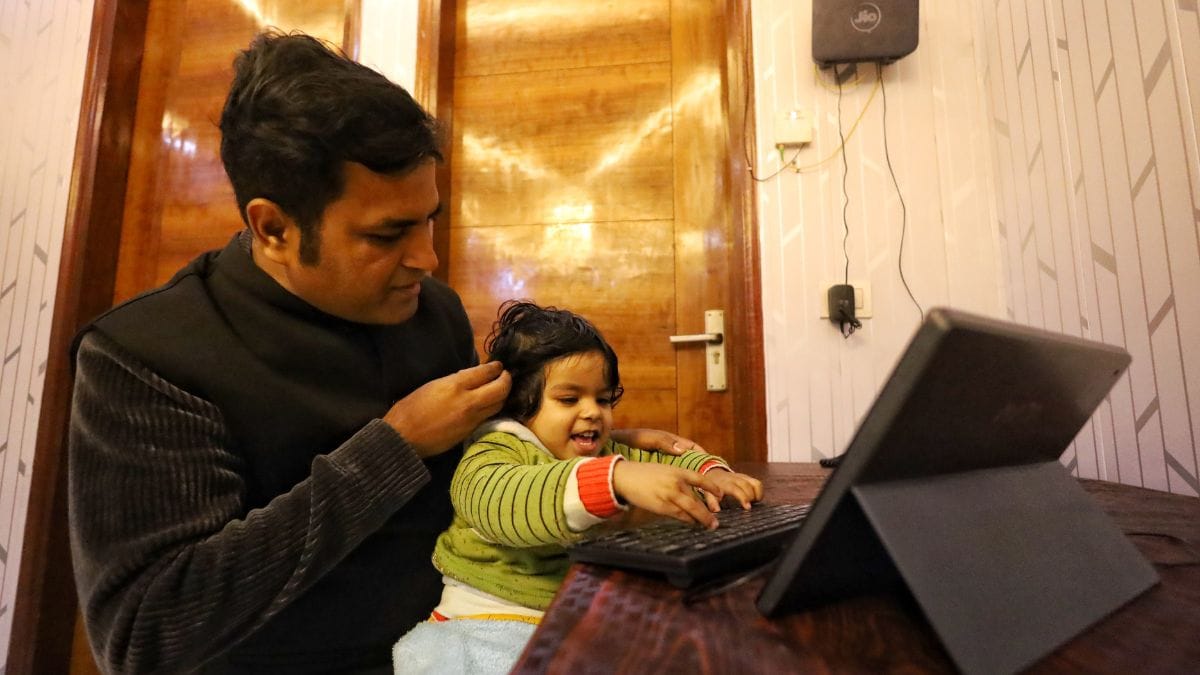
India’s first visually impaired IAS officer, Pranjal Patil from Maharashtra, broke barriers in 2016 when she secured all-India rank 157 and was allocated IAS. He said Kumar’s case should set a precedent.
“This is truly disheartening. Despite clearing the exam, these candidates have had to wait an unreasonably long 15 years for their recommendations. While rules exist, the system often fails to implement them effectively. Unfortunately, this isn’t an isolated incident—many candidates face similar delays. I hope this case sets a precedent for addressing such issues. Considering the immense time, effort, and money these individuals have invested, they deserve proper compensation for their loss,” said Pranjal Patil, IAS officer.
Also read: Varanasi’s Great Temple Hunt—Hindu groups are combing gullies, mosques, Muslim homes
The inhibition
Shiwam Kumar has not celebrated his win yet with his family. After the long legal battle, he has become fearful of things. All these years, he did not live fully. He was too scared that something might happen. The appointment could stop as it used to after winning in different courts.
“I never lived my life fully. My heart was always in this legal battle. I knew I would get justice, but it came very late. I will be able to serve for 14 years. People from my batch are going to become joint secretaries, and I will have to start fresh,” said Kumar.
The judgment helped 11 other visually impaired candidates who did not get recommended by the UPSC. Now, four of them have been allocated to the Indian Information Service.
“There are still a few problems that can occur on my way. When the judgment came, I was scared whether they (UPSC) would implement it or not. The court had given them three months’ time, but we got the appointment in December,” said Kumar while showing a printout of his appointment.
Kumar’s distrust comes from the systemic injustice he faced for years.
His medical examination—to determine his visual impairment—went on for four days at two different hospitals—AIIMS and Safdarjung. Earlier, it used to happen in one hospital, in one day. The result was the same as before—100 per cent visually impaired. This was followed by a lot of paperwork in the ministry and at his current workplace as well.
I never lived my life fully. My heart was always in this legal battle. I knew I would get justice, but it came very late. I will be able to serve for 14 years. People from my batch are going to become joint secretaries, and I will have to start fresh
Shiwam Kumar
He appeared before the UPSC medical board in 2008, 2010, and 2014—the three occasions when he qualified for the interview. Kumar said, it was never this thorough.
“I cannot immediately join the service as I am in a government job. I will have t o get a relieving order from here as well,” said Kumar, who works as a Senior Judiciary Assistant in Delhi District Court in Rohini.
Forty-four-year-old Pankaj Srivastava also fought the legal battle. The judgment came in his name. He works at SBI and is relieved to join IIS in Delhi for training.
Srivastava also cleared the Civil Services Examination in 2008, but since the government had not given effect to the reservation policy under the Persons with Disabilities Act of 1995, he was not appointed.
Srivastava was able to sustain the legal battle because he had a job.
“The SBI exam helped me improve my communication skills and gave me the confidence to pursue justice. During the case, I gathered all the information through RTIs about the posts and recommendations that weren’t complied with. In 2005, PM Manmohan Singh himself had directed the DoPT to address the backlog of vacancies. This made my argument in the court stronger.”
Reflecting on the pivotal moment, he added, “I received my appointment letter on 19 December, and the support from everyone made the transition out of the banking sector so much easier.”
Also read: Now Haryana has a drug problem too. And unique ways of fighting it
‘I had a dream’
Pankaj Srivastava and Shiwam Kumar have spent years running around in courtrooms and in the company of lawyers, filing affidavits. They created a WhatsApp group of four blind people.
“There were four people, but Pankaj and I used to talk over the call all those years. Now it is a collective win, although it came as a surprise to those who were not involved in the legal matter,” said Kumar.
Kumar and Srivastava had challenged their non-appointment to the vacancies for people with disabilities that had remained unfilled between 1996 and 2009.
In 2012, the Central Administrative Tribunal ruled in their favor. The ruling was challenged by the Centre before the Delhi High Court, which upheld Srivastava and Kumar’s case in 2013. The Centre then took the challenge to the Supreme Court.
Now, Kumar’s younger self looks at him with a little pride. “I had a dream in my childhood, I topped every class in school and Now I think all my hard work has some meaning. Still it’s not that what I wanted but I am happy.”
Shiwam Kumar lost his vision at the age of 17 when he was in Class XII. He visited several doctors but the answer was the same—he couldn’t get his vision back. He even devoted hours meditating.
“I used to pray to God. I had a strong belief that my vision would come back. I used to be in Sadhna for 10 minutes to 7 hours,” said Kumar, who is a devotee of Goddess Gayatri—the deity of knowledge.
After spending nearly five years of struggling to get his eyesight back, Kumar accepted that he had to move on. He came to Delhi and joined a blind school to learn basic skills to be self-dependent.
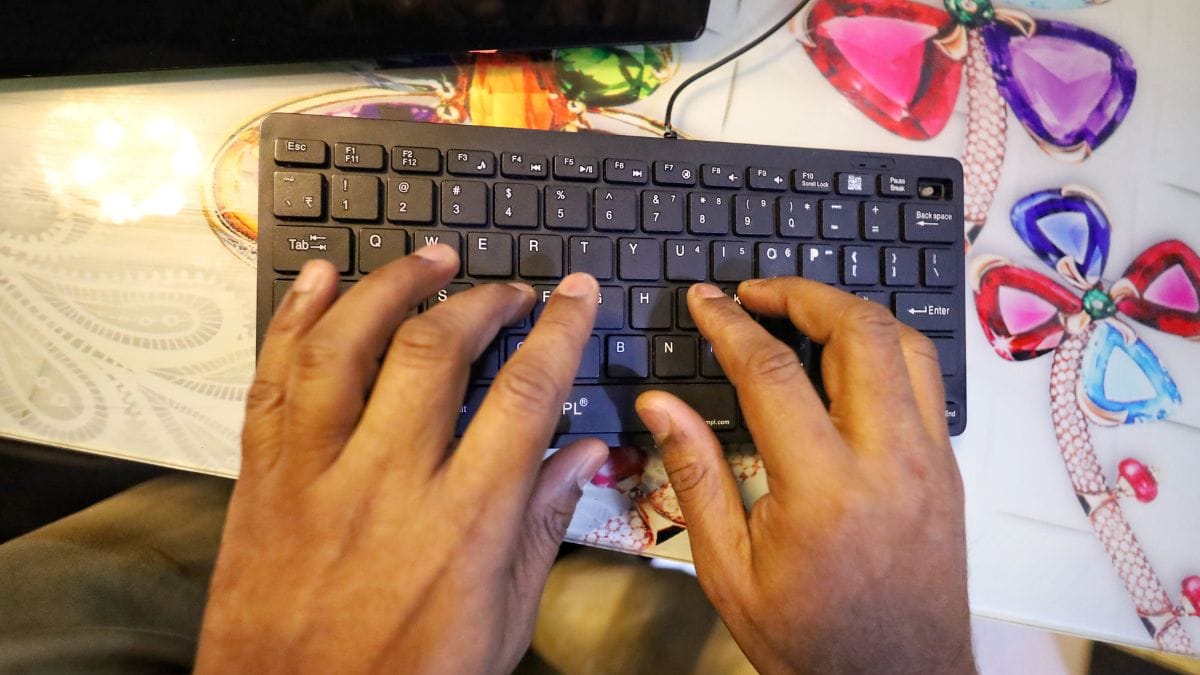
“I joined a blind school that used to be run by an NGO. I learned the basic skills there, and I got admission to a B.A. correspondence course at Delhi University and, simultaneously, I went to Dehradun to learn computer skills. I learned shorthand as well,” said Kumar while showing voice software.
In 2003, Kumar got a job in Delhi’s District Court.
“I used to work the whole day in the court and spent the night studying. I collected books, scanned them, and made Word files. Through software GAWS and NVDA, I used to study,” said Kumar.
A full-time job meant Kumar couldn’t attend any coaching. He had developed headaches after losing his eyesight, and the medicine he used to take made him drowsy.
“It used to make my brain slow, so I had to struggle a lot while studying,” he said.
In 2008 he cleared the exam after two attempts and appeared for the Main examination, and gave the interview as well. In his eight year UPSC journey, he cleared five prelims, wrote three mains, and appeared in three interviews.
“We get to have scribes for writing the exam. In my first mains, I thought my scribe was slow, so in the next one, I decided to write on my own. Because I was not born blind and I knew how to write, I wrote the exams,” said Kumar.
In 2016, Kumar got married and now he has two daughters.
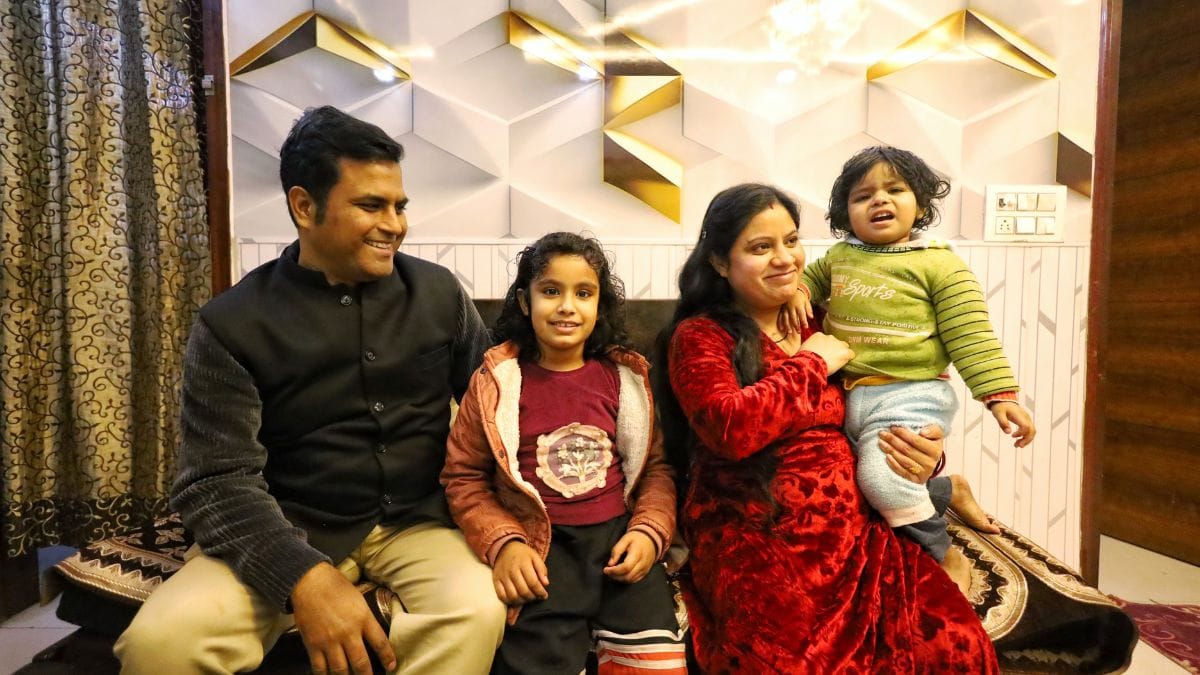
Also read: The afterlife of stolen antiquities when they are returned to India
Passing on the childhood dream
An autorickshaw stands outside Kumar’s house every morning to take him to his workplace—the Delhi district court in Rohini. In the court complex, Kumar is not just any other employee. He has been consistently working towards making the workplace better for the disabled.
In the past 21 years, Kumar has done plenty of things there.
“I got approval for four special casual leaves for people with special abilities. I helped in the recruitment of 15 visually impaired people in Delhi District Court, and I am very good at my work,” said Kumar.
His colleagues are upset that Kumar will be leaving and that he won’t be able to support them.
Kumar’s wife Pushpanjali Rani witnessed some of his struggles from up close after their marriage in 2016. She spends most of her days taking care of Kumar and their two children.
“He was involved in that case very much. He always said that he would get that job one day. I believed him every time, and finally, it came true.”
Now, Kumar and his family are thinking whether they should change houses to relocate somewhere near the Indian Institute of Mass Communication—the place where Kumar’s training as IIS will begin. They currently reside in Rohini, which is far from there.
“We are still figuring out what we have to do and how we are going to do it. We might put this flat on rent and take a place there. But the children’s school is here, and we cannot compromise the elder daughter’s education,” said Rani.
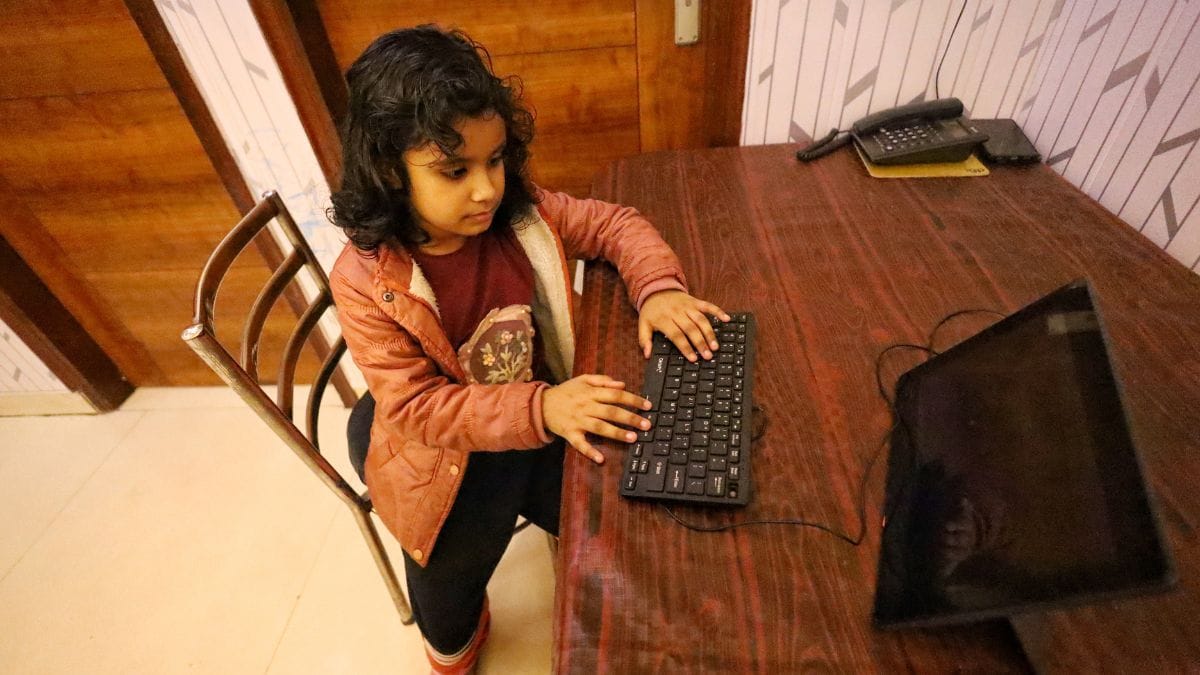
Kumar’s elder daughter Aashi holds keen interest in general knowledge. She often watches such content on YouTube.
“We never force her to study, but she is curious child,” said Kumar.
For a seven-year-old, Aashi is invested in her father’s career. She knows that an IAS officer’s job is the most prestigious in the country and that her father wanted to become one.
But Shiwam Kumar has compromised with his destiny, settling for the IIS. His childhood dream of becoming an IAS officer hasn’t died yet. He has passed it on to his daughter.
“My daughter is also very bright.”
(Edited by Anurag Chuabey)



